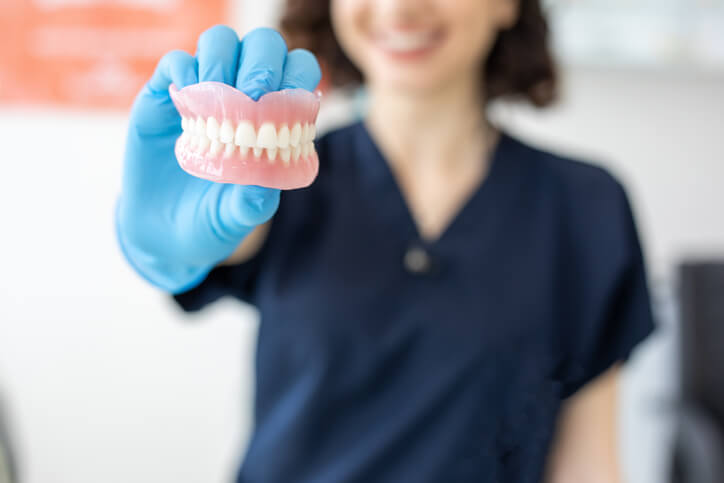Dentures play an important role in improving the quality of life for individuals with missing teeth. They make it possible for those individuals to eat and speak naturally again and can restore confidence with a bright and full smile. Both full and partial dentures are available, but which is the right solution for your needs?
Full Dentures
Full dentures serve as a removable replacement for an entire mouth of teeth. They’re the appropriate option for anyone who is missing all of their teeth. If you’re missing most of your teeth, it may be appropriate to extract the remaining teeth (especially if the remaining teeth are decayed or damaged) to allow for full dentures or other full arch replacement options.
Dentures can be made from a wide variety of materials. Today most are porcelain or resin. Your dentures will be custom-made to provide the right fit and appearance. Impressions and measurements of your gums and jaw are taken and used to create your dentures.
Full dentures provide a great range of benefits for individuals missing all of their teeth. They provide a full smile so that you can greet the world confidently. They also let you eat and speak easily. Dentures also improve the overall aesthetics of your face, preventing the sunken look that can result from missing most or all of your teeth.
Partial Dentures
Partial dentures are similar to full dentures in their construction and function but don’t replace an entire arch of teeth. Instead, partial dentures are used when the dentist needs to replace several teeth in a row.
You can think of partial dentures as a kind of removable dental bridge. While dental bridges require altering teeth on either end to serve as a permanent foundation, partial dentures attach with metal clips or other connection options.
Partial dentures are an appropriate option for individuals who are missing some, but not most, of their teeth. They rely on adjacent teeth for support, so any gap will need to have strong, healthy teeth on both sides for partial dentures to work.
Your partial dentures can provide many of the same benefits as full dentures. They make eating and speaking easier and restore the fullness of your smile. Partial dentures also help keep remaining teeth healthy by preventing them from shifting into the gap left by missing teeth. While less effective than dental bridges in this area, they provide a considerable benefit.
Conventional partial dentures use metal clasps to remain fixed in place. This keeps them firm and steady, making chewing easier and preventing any movement that could cause sore spots. Today, metal-free partial dentures are also available. These use different attachment methods that can look more natural and are suitable for individuals with metal allergies.
How can I find out which option is right for me?
If you’re missing some or all of your teeth, the first step is to reach out to your dentist. Every patient’s situation is unique, so there aren’t any simple rules to decide which tooth replacement option is right for you.
The dentist will evaluate the condition of your gums, jawbone, and any remaining teeth. They’ll also discuss your individual needs and lifestyle. From this, they can develop a treatment plan that may include full or partial dentures or other tooth replacement options like crowns, bridges, or dental implants.
If you’re concerned about missing teeth in terms of aesthetics or health, you can reach out to Cohen Dental Care to find out more about your restorative dentistry options in Great Neck and Briarwood. Contact our office today to schedule your appointment.

